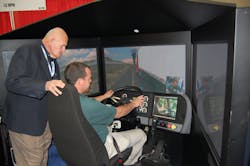While truck driving simulators remain expensive technology – full-motion simulation systems can cost as much as $100,000 a pop – fleets and researchers alike are determining that they can generate significant savings over time by reducing training costs as well as accident-related expenses.
For example, Don Osterberg, senior VP of safety and security at Schneider National, explained to Fleet Owner that the company’s use of simulators since 2005 helped in part to reduce the carrier’s crash rates by 32% when compared to its use of what he called “traditional” training methods that relied exclusively on classroom work and in-cab instruction.
From a training perspective, though, Osterberg said Schneider also calculated that simulators helped achieve training objectives faster and at a lower cost. “The ability to use repetition is the key,” he pointed out. “We can practice things over and over and over in a simulator at a much faster pace than in an actual truck.”
Schneider calculated – based on its 7 years of experience with the technology – that one hour of simulator time equals about four hours of behind-the-wheel training in a truck. With one hour of in-truck training consuming an average of 2.5 gallons of diesel, Schneider can reduce training costs some $40 per hour alone due to fuel savings (with diesel costing $4 per gallon) by using simulators to help train new drivers as well as re-certify the skills of veteran operators.
“There’s also the wear-and-tear we’re saving on transmissions, engines, wheels, and everything else on a real truck – all while providing a way to increase time spent learning to shift, maneuver in poor weather situations, etc,” Osterberg noted. “It’s a win-win-win for us.”
Justin Morgan with the Center for Truck & Bus Safety at the Virginia Tech Transportation Institute (VTTI) headed up a research group that also examined the possible “cost-benefits” associated with simulator training for new or “rookie” drivers.
He told Fleet Owner that one of his group’s major findings is that the student drivers they tracked performed roughly the same during the truck-based portion of their commercial driver’s license (CDL) exam regardless of whether they’d trained in an actual truck or in a simulator.
“We found no major differences in skill sets, which suggests simulator time can replace truck time,” he explained. “That also reduces the training costs associated with truck wear-and-tear, fuel consumption, etc.”
As a subset of VTTI’s research, Morgan said student drivers also reported that it generally proved easier to learn how to shift in a simulator versus a real truck. “The technology also proved useful in honing shifting ability to improve fuel economy, according to what the students told us,” he added.
“It would seem a no brainer to use these tools given the high cost of fuel,” noted Mike Reardon, director of business development for Virage Simulation, which builds truck driving simulators for schools and fleets alike.
“More importantly, when you can evaluate, benchmark, and basically measure anything about driving, you can align training for addressing a fleet's operational challenges,” he said.
However, Schneider’s Osterberg stressed that simulators cannot replace either real trucks or especially human instructors in the driver-training process. Rather, they serve as more detailed “tools” that help improve the quality level of driver training while minimizing the more expensive parts of it.
“You need an ‘integrated model’ for training that includes simulators, real trucks and instructors – you need that ‘human element’ to provide subjective feedback so critical to sharpen driving skills,” he said. “You need all three in the training kit bag.”
About the Author
Sean Kilcarr
Editor in Chief
Sean Kilcarr is a former longtime FleetOwner senior editor who wrote for the publication from 2000 to 2018. He served as editor-in-chief from 2017 to 2018.
